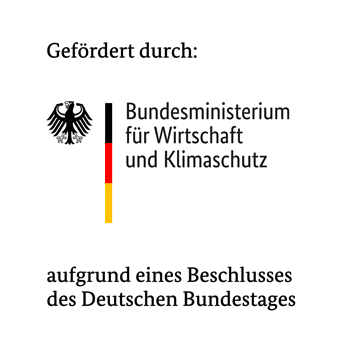In order to reduce greenhouse gas emissions, the transport sector also needs to be addressed. One option is to run the existing vehicle fleet on renewable fuels instead of petroleum-based fuels. This can be done using methanol-to-gasoline, or MtG for short.
Project start: Influence of MtG grades on fuel stability and emission behavior

BMWK funding as of April 1, 2022
To this end, the BMWK is funding a research project aimed at optimizing the production and purification steps of the MtG process. To this end, different MtG grades will first be produced, with some variations in the process. Both the operating conditions, such as temperature and pressure, and the catalyst will be changed. In addition, regeneration cycles of the catalyst will be investigated. The refining of the crude gasoline will also be varied, with both distillation and hydrogenation. The resulting fuels are then analyzed using various methods. These primarily include standard analysis in accordance with EN 228.
After selecting two best grades, these are produced in larger quantities for further testing. These include emissions, measured via a single-cylinder engine, and interactions with materials and corrosion effects. Similarly, aging tests will be conducted to investigate long-term stability. The determination of RON will be studied experimentally in a new method to be developed.
Research Centres
OWI Science for Fuels gGmbH, Herzogenrath
IEC Institute for Energy Process Engineering and Chemical Engineering of the Freiberg University of Mining and Technology
TME Chair of Thermodynamics of Mobile Energy Conversion Systems of RWTH Aachen University
Networked together
The project, which was initiated by the members of the DGMK Technical Committee on Fuels, will run for 2.5 years and will be supported by a group of experts from various sectors. Representatives of the energy and automotive industries, plant manufacturers, additive producers, analytical experts and development service managers are involved.
The IGF project (22377 N) of the research association Deutsche Wissenschaftliche Gesellschaft für nachhaltige Energieträger, Mobilität und Kohlenstoffkreisläufe e.V., Große Elbstraße 131, 22767 Hamburg, Germany, is funded by the German Federal Ministry of Economics and Climate Protection via the AiF within the framework of the program for the promotion of joint industrial research (IGF) based on a resolution of the German Bundestag.